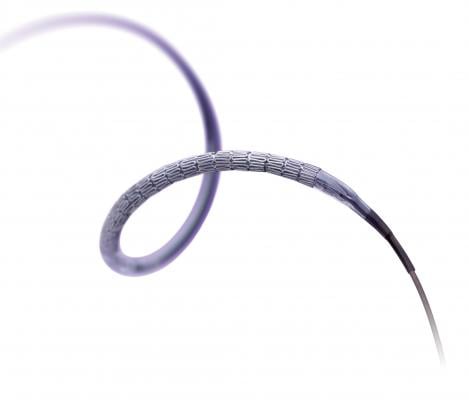
The Medtronic Endeavor drug-eluting stent was used in the PERSPECTIVE trial to test its durability in chronic total occlusions (CTOs).
May 14, 2018 – One-year outcomes of patients undergoing chronic total occlusion (CTO) percutaneous coronary intervention (PCI) treated with zotarolimus-eluting stents (ZES) showed positive outcomes in the PERSPECTIVE trial.[1] Results of the study were presented as late-breaking clinical science at the 2018 Society for Cardiovascular Angiography and Interventions (SCAI) Scientific Sessions.
The ZES included in the study were manufactured by Medtronic and represent a modern, newer generation drug-eluting stent (DES).
CTO is a complete blockage of one or more coronary arteries that has been present for at least three months and occurs in 20 percent of patients with coronary artery disease (UVA Health). CTO PCI has become the preferred treatment option for complex, high-risk patients due to improvements in equipment and novel procedural techniques. There is limited data on procedural and long-term safety and efficacy of CTO revascularization applying modern techniques with newer generation DES.
The prospective, single-center rigorously performed PERSPECTIVE trial examined procedural, clinical and health status outcomes using contemporary methods and was reviewed by an independent core laboratory and events committee. Among consecutive patients undergoing attempted CTO PCI, procedural and in-hospital clinical outcomes were examined in addition to major adverse cardiac events (MACE) — death, myocardial infarction and target lesion revascularization. In a pre-specified cohort of prospectively followed patients, quality of life was measured at baseline and one-year. A one-year MACE analysis of patients treated with ZES was compared to a pooled analysis of historical drug-eluting stent (DES) trials.
The study included 183 patients with successful CTO recanalization and treatment with ZES. Successful guidewire achievement of at least TIMI 2 flow was observed in 93.4 percent of patients. Compared with performance goals from prior CTO DES trials (one-year MACE, 25.2 percent), treatment with ZES was associated with significantly lower occurrence of adverse events (7.6 percent). One-year rates of myocardial infarction and target lesion revascularization were 3.5 percent and 1.7 percent, respectively. Patients reported significant improvement to quality of life from baseline to one-year (Seattle Angina Questionnaire, 72.3 ± 26.3 versus 96.3 ± 10.2).
“Our study is the most comprehensive review of the safety, efficacy and durability of contemporary stent techniques with ZES for a high-lesion, complex patient population,” said lead author David Kandzari, M.D., Piedmont Heart Institute in Atlanta. “Not only were the success rates favorable, but we were also able to demonstrate that patients reported an improved quality of life, which should be considered one of the most important outcomes of any procedure.”
The authors of the study note the FDA is currently reviewing this study data for a potential expanded label indication for the Medtronic ZES.
Complete listing of SCAI 2018 late-breaking trials with links to articles.
Reference:


 January 05, 2026
January 05, 2026 









